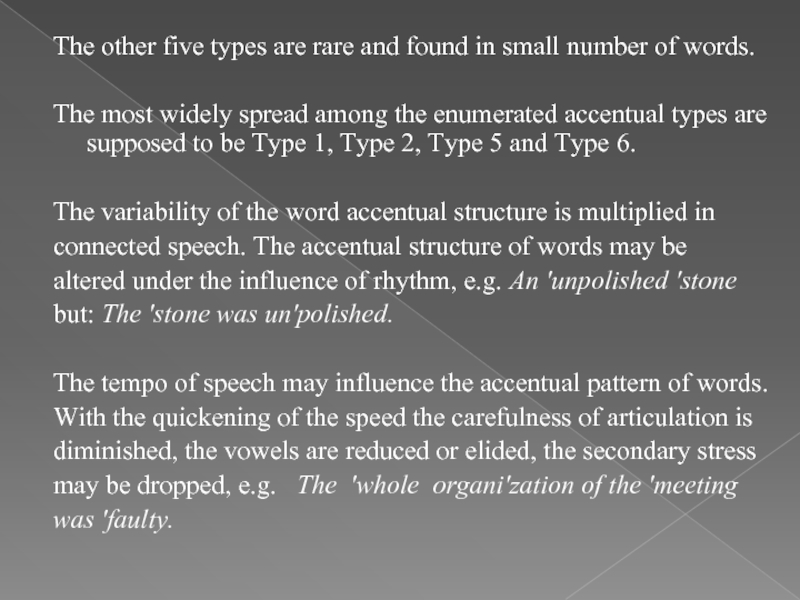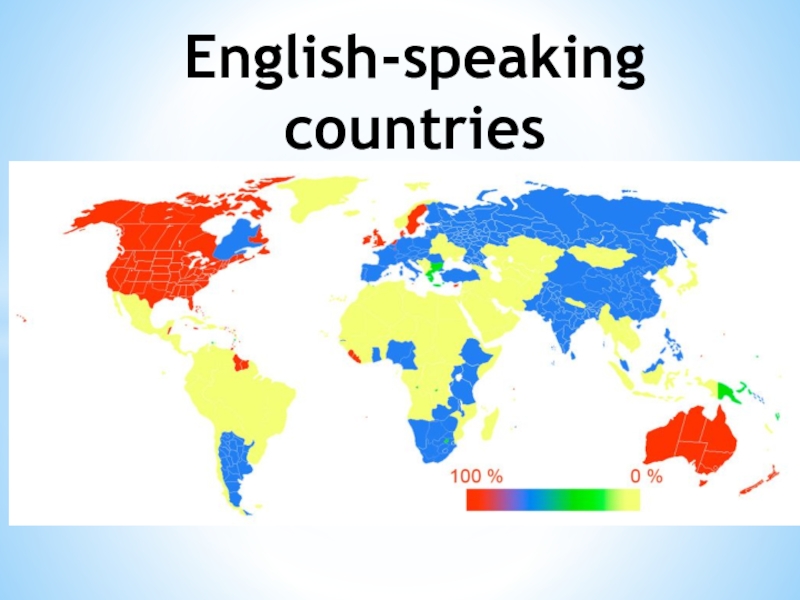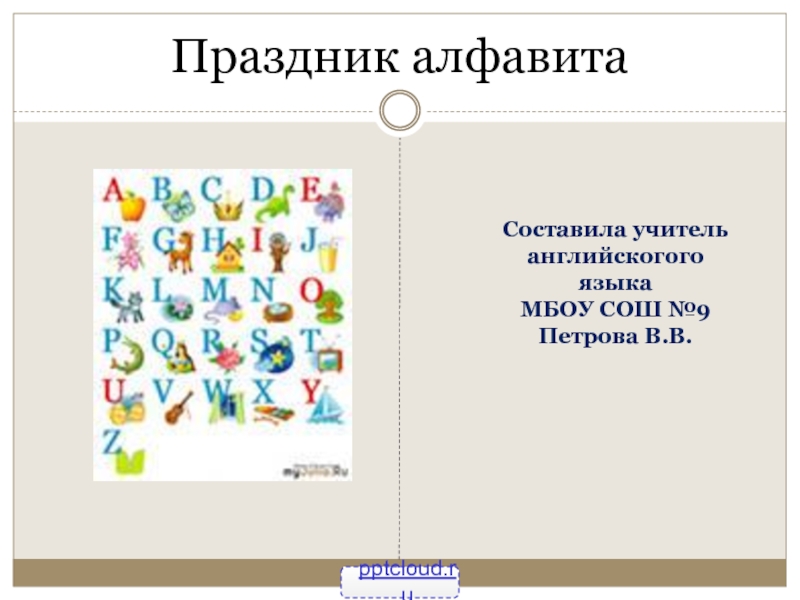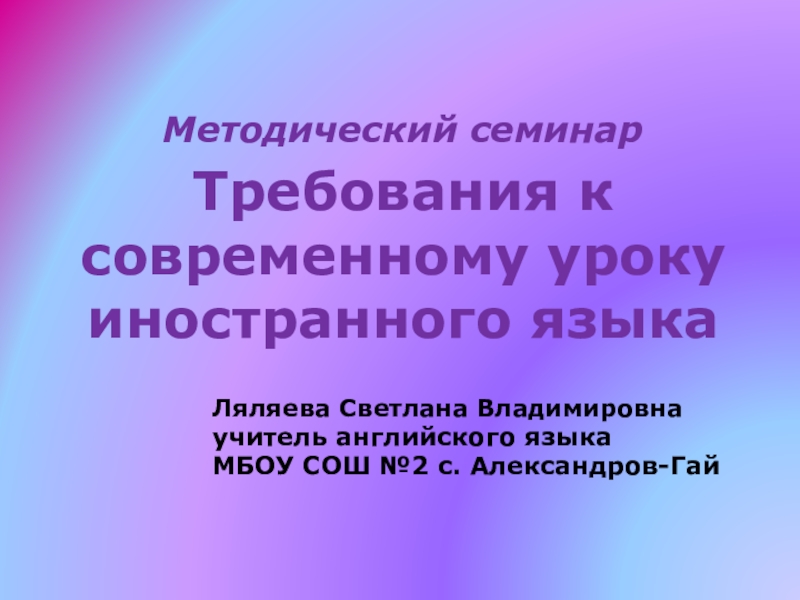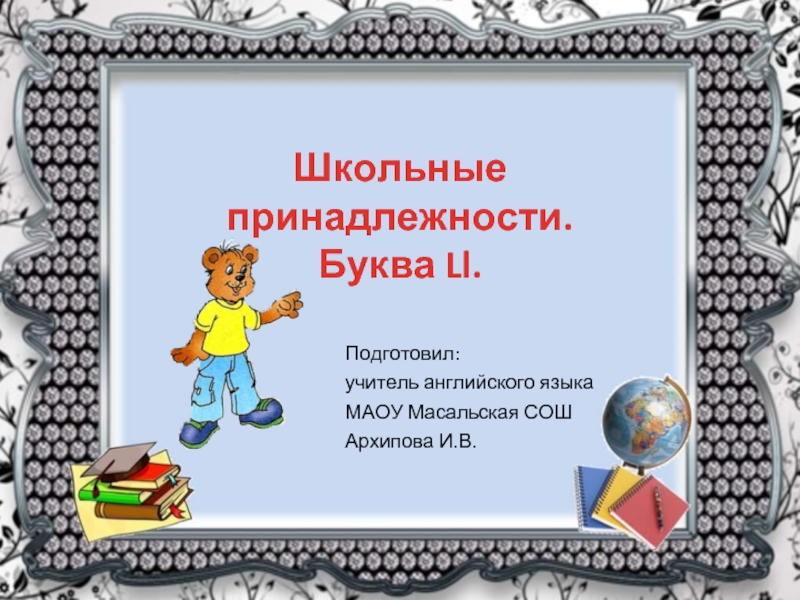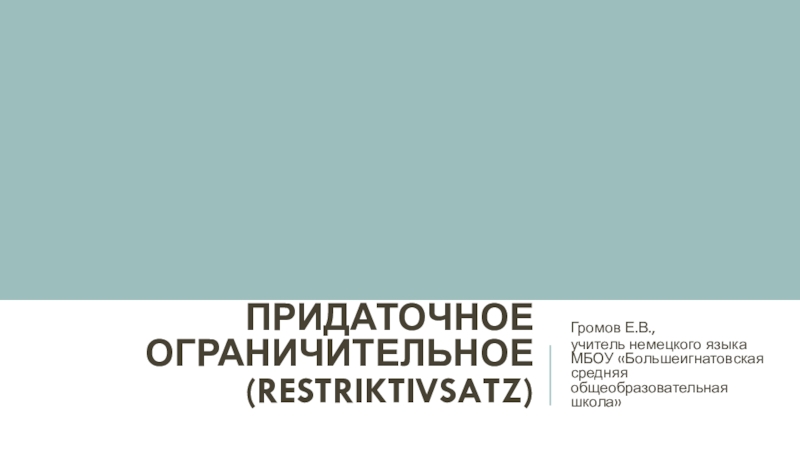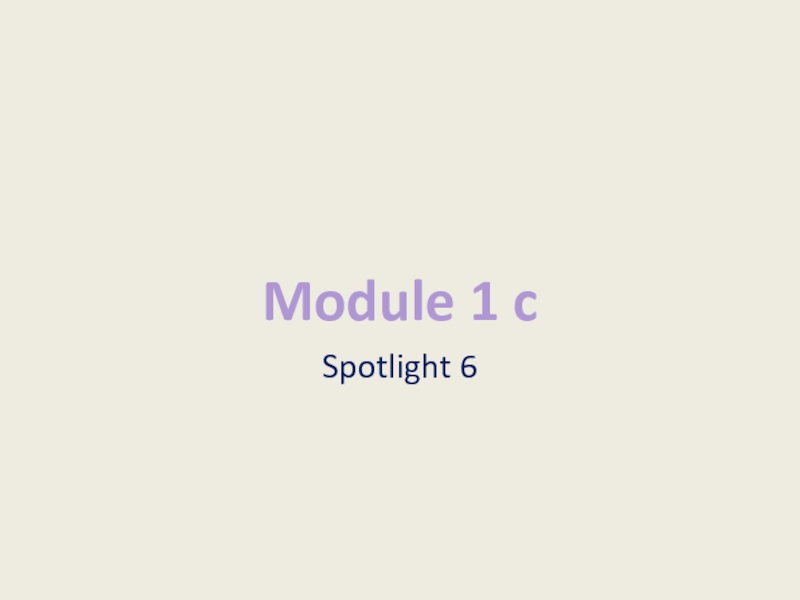Разделы презентаций
- Разное
- Английский язык
- Астрономия
- Алгебра
- Биология
- География
- Геометрия
- Детские презентации
- Информатика
- История
- Литература
- Математика
- Медицина
- Менеджмент
- Музыка
- МХК
- Немецкий язык
- ОБЖ
- Обществознание
- Окружающий мир
- Педагогика
- Русский язык
- Технология
- Физика
- Философия
- Химия
- Шаблоны, картинки для презентаций
- Экология
- Экономика
- Юриспруденция
Word stress
Содержание
- 1. Word stress
- 2. SO…Word stress (WS) can be defined as the
- 3. If we compare stressed and unstressed syllables
- 4. The phonetic manifestation of stress varies from
- 5. Place and degrees of Word Stress One
- 6. The American scholars bloch & trager distinguish 4
- 7. Stress can be characterized as fixed and
- 8. Examples of shifting:preSENT (verb) – PRESent (noun)reFER
- 9. Functions and tendencies of the English stress1. Word stress constitutes
- 10. 2. Word stress enables a person to
- 11. 3. Word stress alone is capable of
- 12. T e n d e n c
- 13. Typology of accentual structuresThe numerous variations of
- 14. The accentual types are:1. ['___]. This accentual
- 15. The other five types are rare and
- 16. Слайд 16
- 17. Скачать презентанцию
Слайды и текст этой презентации
Слайд 2SO…
Word stress (WS) can be defined as the
singling out of
one or more syllables in a
word, which is accompanied
by the change of the force of utterance, pitch of
the voice, qualitative and quantitative
characteristics of the sound which is usually
a vowel.
Слайд 3If we compare stressed and unstressed syllables in the two
contract, we may note that in the stressed syllable:
the force
of utterance is greater, which is connected with more energetic articulation;the pitch of the voice is higher, which is connected with stronger tenseness of the vocal cords and the walls of the resonance chamber
the quantity of the vowel is greater, a vowel becomes longer;
the quality of the vowel !& in the stressed syllable is different from the quality of this vowel in the unstressed position, in why it is more narrow than.
Слайд 4The phonetic manifestation of stress varies from language to language.
In different languages one of the factors constituting word stress
is usually more significant than the others. According to the most salient feature the following types of word stress are distinguished in different languages:dynamic or force stress if special prominence in a stressed syllable(syllables) is achieved mainly through the intensity of articulation;
musical or tonic stress if special prominence is achieved mainly through the change of pitch, or musical tone.
quantitative stress if special prominence is achieved through the changes in the quantity of the vowels, which are longer in the stressed syllables than in the unstressed ones.
qualitative stress if special prominence is achieved through the changes in the quality of the vowel under stress. Vowel reduction is often used as a manipulation of quality in unstressed syllables.
Слайд 5Place and degrees of Word Stress
One of the ways of
reinitiating the
prominence of syllables is
manipulating the degree of stress.
There is
controversy about degrees of WS in English and their
terminology. Strictly speaking,
polysyllabic word has as many
degrees of stress as there are
syllables in it.
Designating strongest syllable by 1, the second strongest by 2, etc., we may represent the distribution Jesses in the following example:
examination indivisibility
igzemineSin indivizibiloti
32415 2536174
The majority of British phoneticians
(D. Jones, Kingdon, A. C. Gimson
among them) and Russian
phoneticians (V. A. Vassilyev,
Shakhbagova) consider that there
are three degrees of word-stress in
English:
primary -- the strongest
secondary -- the second strongest, partial, and
weak -- all the other degrees.
The syllables bearing either primary
or secondary stress are termed
stressed, while syllables with weak
stress are called, somewhat
inaccurately, unstressed.
Слайд 6The American scholars bloch & trager distinguish 4 types of WS Other
American linguists also distinguish four degrees of word stress but
term them:Loud
Reduced loud
Medial
Weak
Primary
Secondary
Tertiary
Weak
Слайд 7Stress can be characterized as fixed and free. In languages
with fixed type of stress the place of stress is
always the same.In English and Russian word-stress is free, that is it may fall any syllable in a word;
Stress in English and in Russian is not only free but also shifting. In both languages the place of stress may shift, which helps to differentiate different parts of speech, e.g. `insult--to in`sult, `import--to im`port.
Слайд 8Examples of shifting:
preSENT (verb) – PRESent (noun)
reFER (verb) – REFerence
(noun)
exTRACT (verb) – EXtract (noun)
inCREASE (verb) – INcrease (noun)
OBject (noun)
– obJECT (verb)Слайд 9Functions and tendencies of the English stress
1. Word stress constitutes a word, it
organizes
the syllables of a word Into a language unit
having a definite accentual structure,
that is a pattern of relationship among the syllables;
a word does not exist without the word stress.
Thus the word stress performs the constitutive
function. Sound continuum becomes a phrase
when it is divided into units organized by word
stress into words.
Слайд 102. Word stress enables a person to identify a
succession
of syllables as a definite accentual
pattern of a word.
This function of word stress as known as identificatory(or recognitive).
Correct accentuation helps the listener to make the process of communication easier, whereas the distortedaccentual pattern of words, misplaced word stresses prevent normal understanding.
Слайд 113. Word stress alone is capable of differentiating the meaning
of words or their forms, thus performing its distinctive function.
The accentual patterns of words or the degrees of word stress and their positions form oppositions, e.g. 'import — im'port, 'billow — below.Слайд 12T
e
n
d
e
n
c
I
e
s
of WS
Recessive. The accentual structure of English words is
liable to instability due to the different origin of several
layers in the Modern English word-stock. In Germanic languages the word stress originally fell on the initial syllable or the second syllable, the root syllable in the English words with prefixes. It is seen in the native English words having no prefix, e.g. mother, daughter, brother, swallow; in assimilated French borrowings, e.g. reason, colour, restaurant etc.Rhythmical. The rhythm of alternating stressed and unstressed syllables gave birth to the rhythmical tendency in the present-day English which caused the appearance of the secondary stress in the multisyllabic French borrowings, e.g. revolution, organi'sation, assimilation, etc.
Retentive. Was traced in the instability of the accentual structure of English word stress: a derivative often retains the stress of the original or parent word, e.g. 'similar — as'simitate, recom'mend — recommen 'dation.
Слайд 13Typology of accentual structures
The numerous variations of English word stress
are systematized in the typology of accentual structure of English
words worked out by G.P. Torsuyev. He classifies them according to the number of stressed syllables, their degree or character (the main and the secondary stress). The distribution of stressed syllables within the word accentual types forms accentual structures of words. Accentual types and accentual structures are closely connected with the morphological type of words, with the number of syllables, the semantic value of the root and the prefix of the word.Слайд 14The accentual types are:
1. ['___]. This accentual type marks both
simple and compound words. The accentual structures of this type
may include two and more syllables,e.g. 'fafher, 'possibly, 'mother-in-law, 'gas-pipe.
2. [ '_ '_ ]. The accentual type is commonly realized in compound words, most of them are with separable prefixes,
e.g. 'radio-'active, 're'write, 'diso'bey.
3. [ '_' _ '_ ] and
4. ['_' _ '_ '_]. The accentual types are met in initial compound abbreviations
e.g. 'U'S'A, 'U'S'S'R.
5. ['_ ,___]. The type is realized both in simple and compound words, very common among compound words,
e.g. 'hair-,dresser, 'substructure.
6. [, _'___]. The accentual type marks a great number of simple words and some compound words as well. In simple words the stresses fall onto:
e.g.1. the prefix and the root: maga'zine;
2. the root and the suffix: ,hospi'tality;
3. the prefix and the suffix: disorganization.
Слайд 15The other five types are rare and found in small
number of words.
The most widely spread among the enumerated accentual
types are supposed to be Type 1, Type 2, Type 5 and Type 6.The variability of the word accentual structure is multiplied in
connected speech. The accentual structure of words may be
altered under the influence of rhythm, e.g. An 'unpolished 'stone
but: The 'stone was un'polished.
The tempo of speech may influence the accentual pattern of words.
With the quickening of the speed the carefulness of articulation is
diminished, the vowels are reduced or elided, the secondary stress
may be dropped, e.g. The 'whole organi'zation of the 'meeting
was 'faulty.
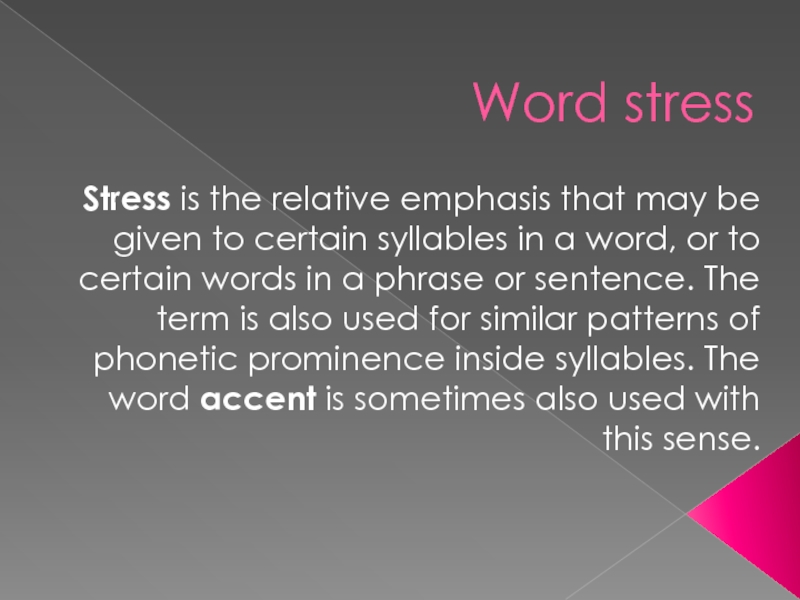
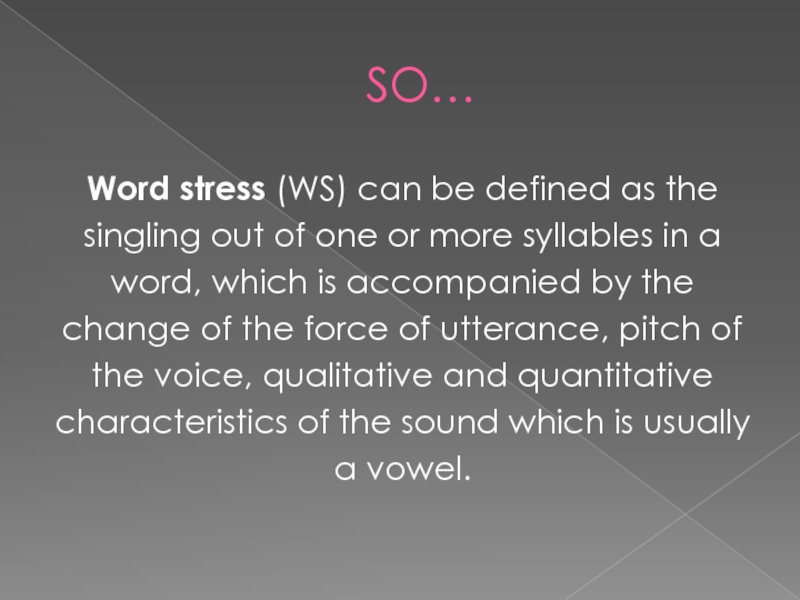
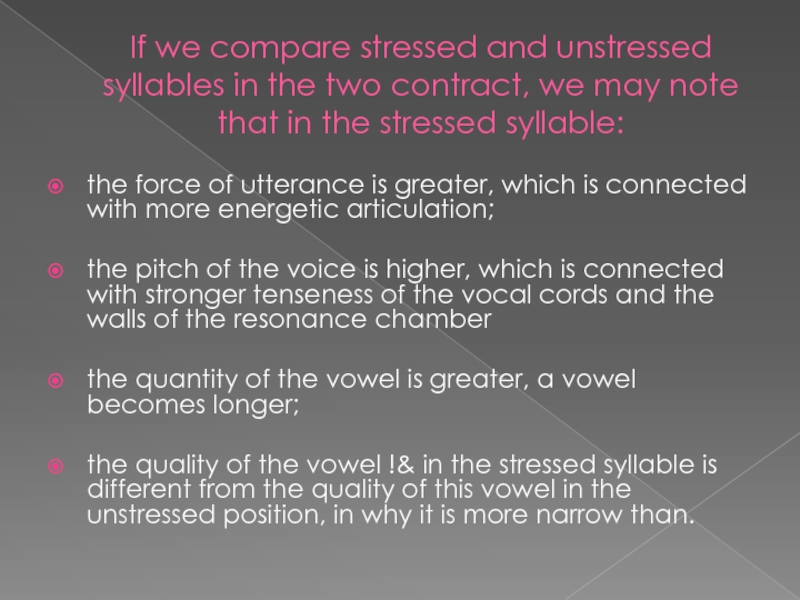
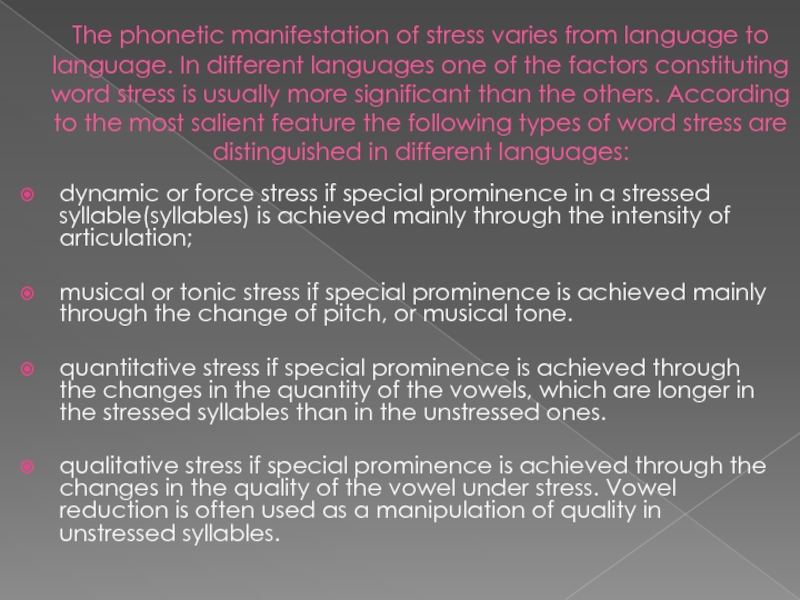
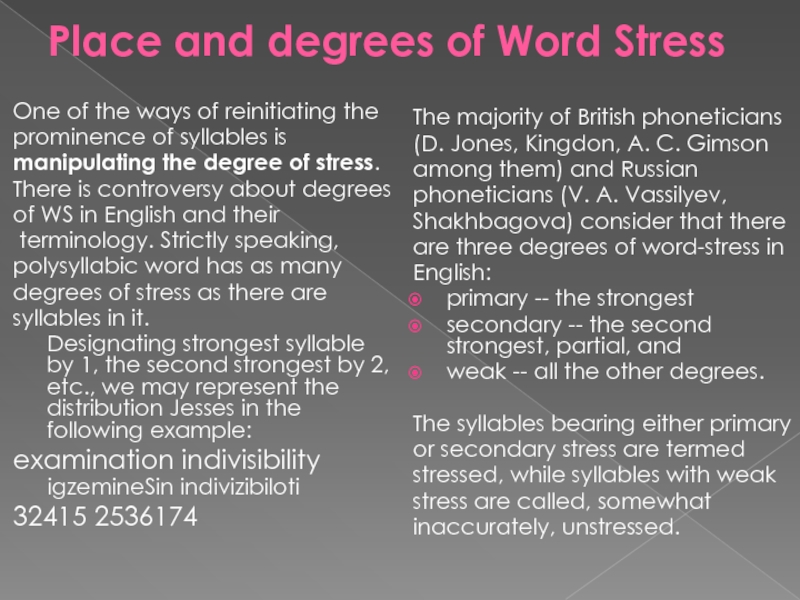
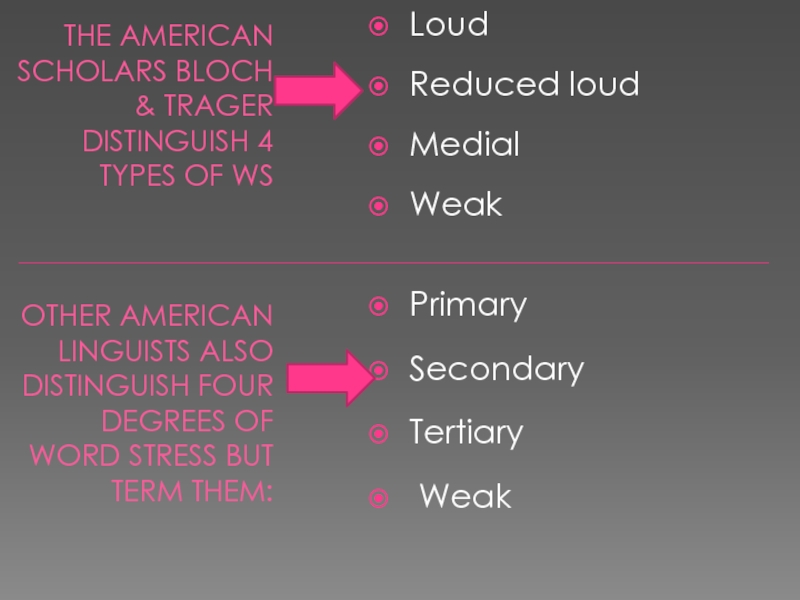
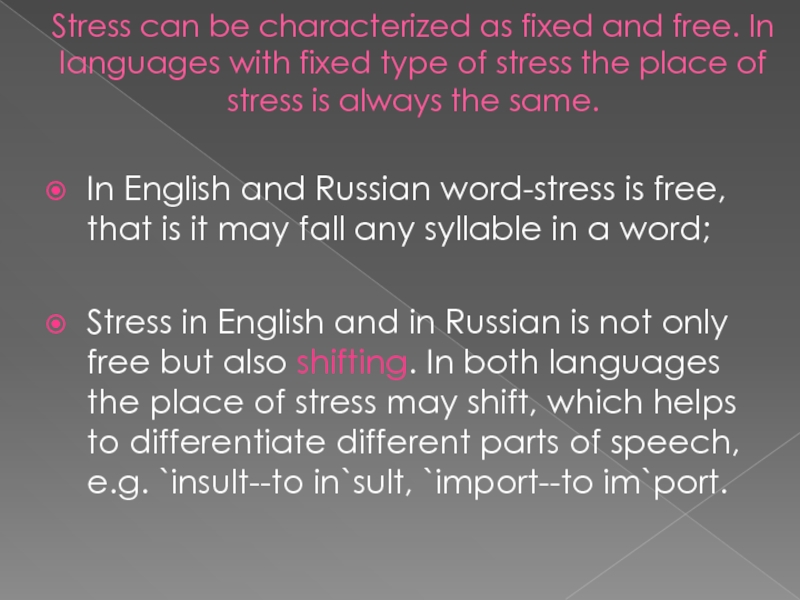
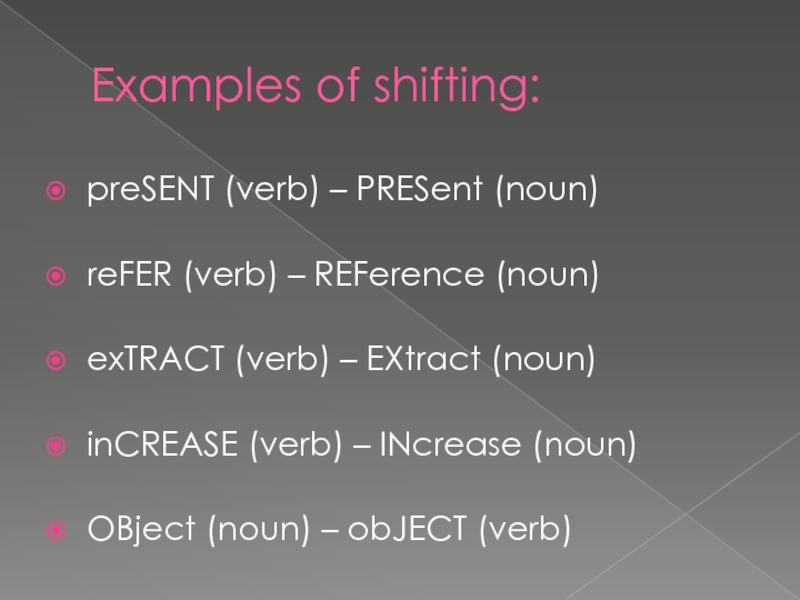
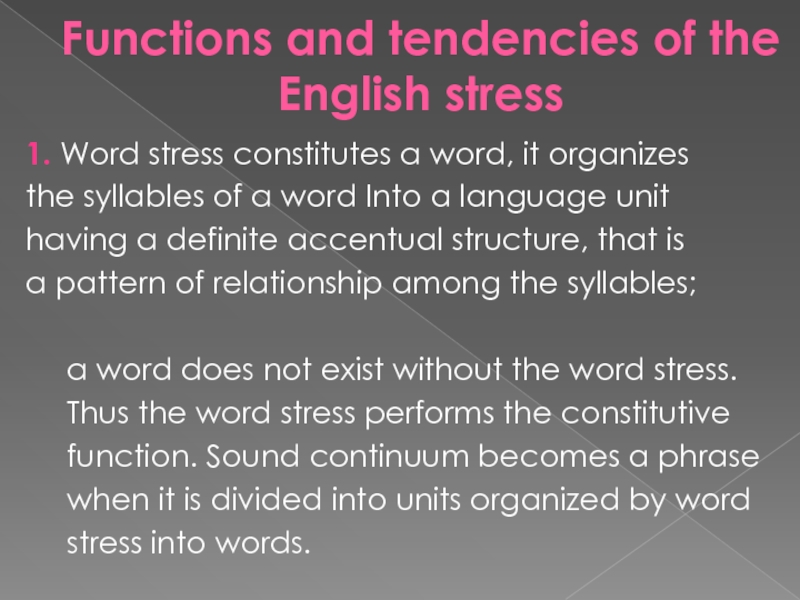
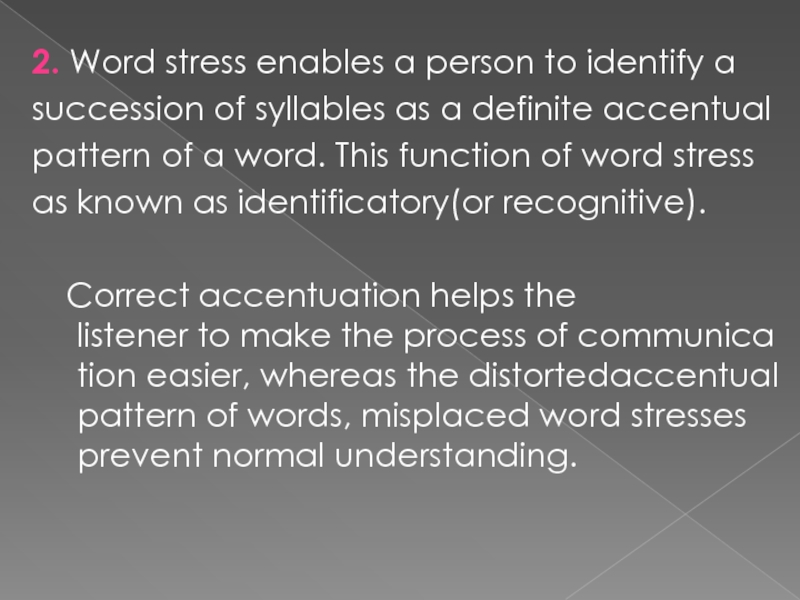
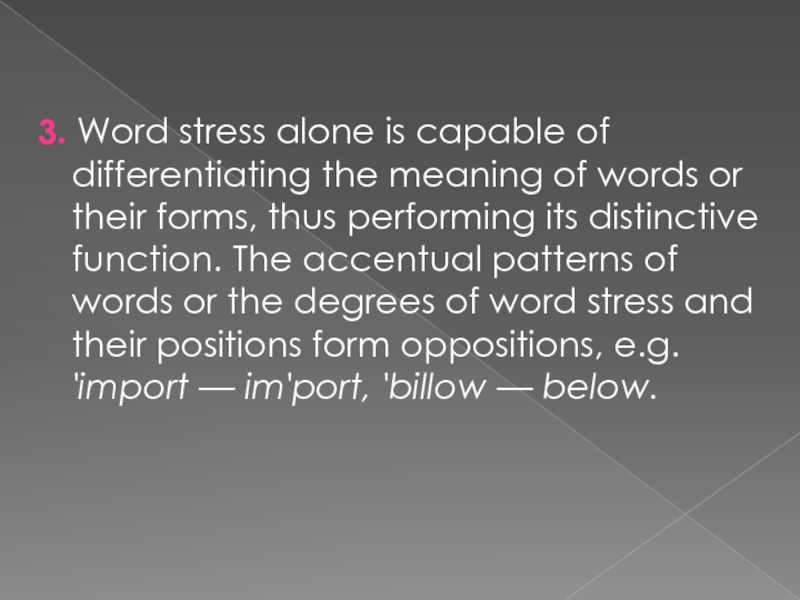
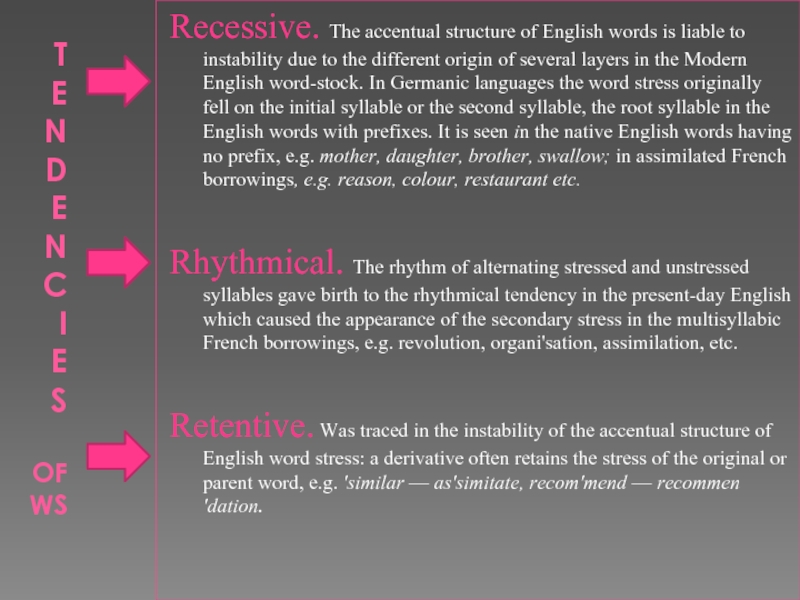
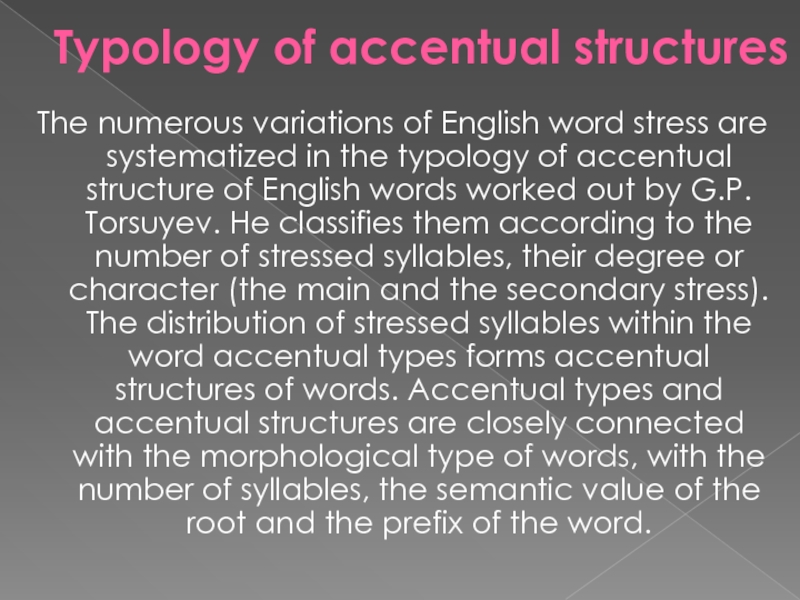
![Word stress The accentual types are:1. ['___]. This accentual type marks both simple The accentual types are:1. ['___]. This accentual type marks both simple and compound words. The accentual structures](/img/thumbs/e586559ccb4f33326193b8b79e2abae5-800x.jpg)
